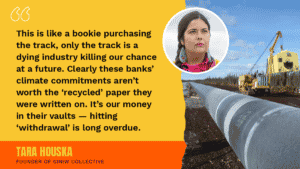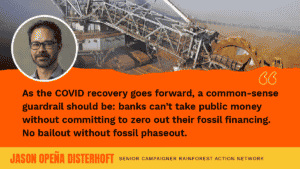NEW YORK, NY — The news that major U.S. banks like JPMorgan Chase are preparing to ask regulators to allow them to take direct ownership of oil and gas companies should ring major alarm bells on Capitol Hill and across the nation, according to organizations with the Stop the Money Pipeline coalition.
On Thursday evening, Reuters reported that JPMorgan Chase & Co, Wells Fargo & Co, Bank of America Corp, and Citigroup Inc are each preparing to set up independent companies that could directly own oil and gas assets.
“So Chase and Wells Fargo want to cut out the middleman and go into the oil business, directly destroying the climate? Greed does weird things to your mind and your heart,” said Bill McKibben, co-founder of 350.org.


These plans are in direct contradiction to the banks’ stated goals of addressing the climate emergency. The only possible justification for taking an ownership stake in an oil and gas company would be to immediately begin winding down production and retiring existing assets, while taking care of workers by providing full benefits and pension guarantees. According to the Reuters reporting, however, banks seem to be planning to do just the opposite, attempting to move the companies back into profitability, likely by taking advantage of federal bailout money that should go to working families.
“This is like a bookie purchasing the track, only the track is a dying industry killing our chance at a future. Clearly these banks’ climate commitments aren’t worth the ‘recycled’ paper they were written on,” said Tara Houska (Couchiching First Nation), founder of Giniw Collective. “It’s our money in their vaults — hitting ‘withdrawal’ is long overdue.”


There is little reason to believe that the four banks mentioned in the article have any intention of mitigating the climate impact of their actions. JPMorgan Chase, Wells Fargo, Citi, and Bank of America are, in that order, the four largest global bankers of fossil fuels, as detailed in the recently released “Banking on Climate Change: Fossil Fuel Finance Report 2020.”
“JPMorgan Chase, Wells Fargo, Bank of America and Citi are the top four fracking banks in the world, and the top four fossil fuel banks in the world. This development exposes the central role of banks in fossil fuels and clearly illustrates the riskiness of fossil finance,” said Jason Opeña Disterhoft, senior campaigner with Rainforest Action Network. “As the COVID recovery goes forward, a common-sense guardrail should be: banks can’t take public money without committing to zero out their fossil financing. No bailout without fossil phaseout.”


Along with the terrible climate and public health impacts of funding these oil and gas companies to continue to pollute, allowing financial institutions to directly own fossil fuel assets is an open invitation to corruption. In 2013, JPMorgan Chase paid a $410 million fine for manipulating electricity markets in the Midwest. The same year, Goldman Sachs was caught fixing aluminum prices by hoarding it in warehouses owned by the bank. Allowing banks to own companies in an industry already known for its corruption, disregard for public safety, and flagrant violation of environmental laws is a recipe for disaster.
“No way no how should regulators bail out climate-destroying banks like JPMorgan Chase from bankrupt investments by letting them become oil and gas holding corporations,” said Pete Sikora, Climate Campaigns Director, New York Communities for Change. “The government should take over bankrupt oil and gas assets in order to rapidly retire them while protecting dependent workers and communities, not bank profits.”


Elected officials and regulators have raised the alarm before about financial institutions taking direct ownership of fossil fuel companies. This session in Congress, Reps. Jesús “Chuy” García (IL-04) and Rashida Tlaib (MI-13) have introduced the Protecting Consumers Against Market Manipulation Act to set stronger limits separating banking and commerce, including by limiting banks’ ownership of commodities. Sens. Elizabeth Warren (D-MA) and Sherrod Brown (D-OH) have also warned of the risks of bank ownership of physical commodities, including fossil fuel assets.
“Particularly at this moment, banks should be using their balance sheets to support small businesses and workers, not trying to spin a profit by propping up a dying industry that’s the leading cause of climate change. If the banks are going to own oil and gas companies, the only acceptable outcome is to wind down the companies, retire their polluting assets, and take care of their workers,” said Moira Birss, Climate and Finance Director at Amazon Watch.
The Stop the Money Pipeline coalition is calling on Congress and federal regulators to take immediate action to ensure the response to the coronavirus pandemic doesn’t worsen the ongoing climate emergency. First, they must prevent all banks from taking ownership stakes in fossil fuel companies and assets. Second, they must ensure that no bailout money goes to banks, asset managers, or insurers unless these institutions commit to phasing out their support for fossil fuels and deforestation. Third, they must pass meaningful regulations that safeguard the financial system and the climate, including by limiting financial institutions’ ability to finance fossil fuels and deforestation.
“The Fed should be intervening to make sure that fossil fuel companies are wound down and their workers and environmental obligations taken care of, not passing them off to banks who will look to spin a quick profit at the expense of both people and planet,” said Alec Connon with the Stop the Money Pipeline coalition.
Stop the Money Pipeline will be engaging hundreds of thousands of Americans to send this message directly to Congress and Wall Street on April 23 as part of Earth Day Live, three days of online action around the 50th Anniversary of Earth Day.

